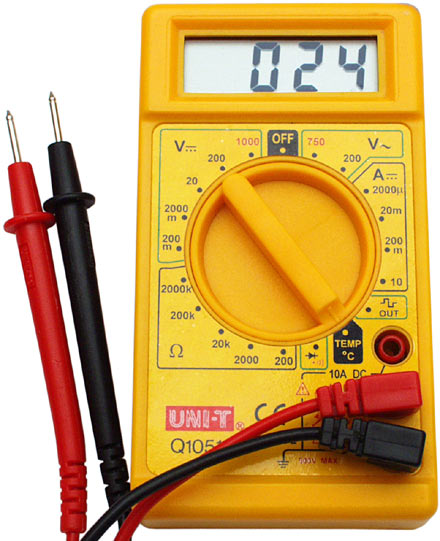- Wed Apr 13, 2011 6:08 am
#98101
I have some potentially exciting news, but I need a little help. I believe I've found a way to easily find the TDS of water using a tool that, although it is common place for someone that dinks around with electronics, is still not super common in most households, but it is certainly more common than a TDS meter. So, here are my thoughts:
TDS meters use the conductivity of water in order to measure how much is dissolved in them. Conductance is simply the inverse of resistance (1/R). Most households that have someone interested in electronics or almost anything that has to do with working with electronics probably has one of these:

This will allow you to measure the resistance of the water. The trick is, for the number crunching we need to have the probes at a set distance apart so the numbers are accurate. Using numbers from this website http://www.engineeringtoolbox.com/total ... _1062.html , we can see we need to keep the probes 1cm apart.
So here's what we need to do. With the probes 1cm apart, measure the resistance of the water ( for our case we want LOW conductivity, which means we want a HIGH resistance, so set the multimeter to as high of resistance measurement it can get). From there, we need to calculate the inverse of the resistance measurement. This will get us conductance. According the the website above:
TDS = 0.7 * conductance
Where conductance is measured in micro-siemens per centimeter.
In more mathy way of writing it out (and it makes more sense to me...)


Here's where I need some help. I don't have a real TDS meter to verify this works correctly. The portion where we invert the resistance per centimeter to conductance leaves some units not quite where I'd like them, so I'm not 100% sure how valid of number we'll get out of it. I tested some of my distilled water, and some water I allowed to run through my soil and I got about 0 for distilled and about 1 for the run through, but I'm not confident in those. Is there anyone that has a real TDS meter and a digital multimeter that may be able to see if this actually works?
TDS meters use the conductivity of water in order to measure how much is dissolved in them. Conductance is simply the inverse of resistance (1/R). Most households that have someone interested in electronics or almost anything that has to do with working with electronics probably has one of these:

This will allow you to measure the resistance of the water. The trick is, for the number crunching we need to have the probes at a set distance apart so the numbers are accurate. Using numbers from this website http://www.engineeringtoolbox.com/total ... _1062.html , we can see we need to keep the probes 1cm apart.
So here's what we need to do. With the probes 1cm apart, measure the resistance of the water ( for our case we want LOW conductivity, which means we want a HIGH resistance, so set the multimeter to as high of resistance measurement it can get). From there, we need to calculate the inverse of the resistance measurement. This will get us conductance. According the the website above:
TDS = 0.7 * conductance
Where conductance is measured in micro-siemens per centimeter.
In more mathy way of writing it out (and it makes more sense to me...)
Here's where I need some help. I don't have a real TDS meter to verify this works correctly. The portion where we invert the resistance per centimeter to conductance leaves some units not quite where I'd like them, so I'm not 100% sure how valid of number we'll get out of it. I tested some of my distilled water, and some water I allowed to run through my soil and I got about 0 for distilled and about 1 for the run through, but I'm not confident in those. Is there anyone that has a real TDS meter and a digital multimeter that may be able to see if this actually works?

